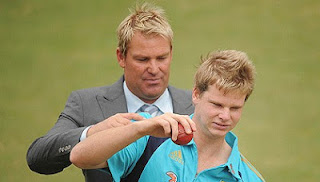Soccer (as a game) is fine, most of the issues seem to arise from the actions of the fans. Basketball seemingly peaked with Michael Jordan's career, but is still widely played and supported and the supporters don't seem to bemoan changes in the game or dwell on the games seemingly inevitable demise.
 |
| Apart from maybe this guy. |
So what is it about Cricket?
The game of cricket has benefited and suffered from its colonial past; all of the current top Test playing nations were or are members of the British Commonwealth, which gives it a large playing and supporter base (particularly in India), though it has struggled to expand past these borders.
Still, a lot of cricket is still being played and the level of interest in the game has actually increased over the last five years with the advent of Twenty20 (T20) Cricket.
Given that the game is in a healthy state, where are these complaints coming from and what are they all about?
Essentially, all of the complaints seem to relate to all aspects of the way the game is run. T20 is bemoaned for corrupting the game, confusing the annual playing schedule, wearing out players and corrupting the techniques of young cricketers.
India is criticised for bullying all other nations into playing by their own rules, though this criticism does have some justification.
 |
| May or may not be an employee of the BCCI |
There is currently a T20 World Cup held every two years, a Champions League T20 every year, an ODI World Cup every four years, as well as regular tours, domestic leagues and competitions between different nations.
There is a rankings table for each team playing each version of cricket (there are also criticism's about their being too many versions), though this is criticised for being irrelevant and confusing.
The game just can't win.
Or can it?
The overall issue seems to be that, while all of these issues are integrated in their nature, they aren't in practice. The International Cricket Council (ICC) simply needs a way to organise cricket so that it can support all of the versions of the game in a way that aids growth and development, while keeping supporters happy. If that is possible.
The trick is to organise a schedule that allows for all three versions of the game that everyone knows and understands, as well as understand how the results of the games impact the international rankings.
The games should be organised to ensure that they are competitive, but also allow for the game and the teams playing it to develop.
To do this, all the top teams should be organised into groups in which they all play off against one another over a ten month period (see table, below).
This allows every team to have a break (the bye) as well as allow a two month period every year for incidental competitions (e.g. ODI World Cup, IPL, Champions League etc). This two-month window also allows for extended tours (e.g. the Ashes) where / if required) and a break from competition for players (if they want it).
The two month period allocated for competition between teams can be used for Tests, ODIs and T20s - however those teams want to use it.
The 2 teams that finish at the bottom of their league at the end of the 12 month period will move into the league below theirs, while the teams at the top would move up. This would create much more relevance around the rankings tables and interest in competition.
The only real issue with this format is where two teams are due to play each other but are from the same hemisphere, meaning it may not be the right season for cricket. That being said, the structure is not set in stone, it can be moved around to allow for the seasons.
The T20 World cup can be kept every two years and involve all the teams from the top three leagues in the two month break (lets call it Round 6). This World Cup will enable the teams in the bottom league to have exposure to the top teams to help them develop, as well as share in the money to be earned from media rights (similar to the Carling Cup in the EPL).
The ODI World Cup should be more restricted, but help less experienced / developed teams get used to a longer format of cricket.
With this structure in place, it *should* give cricket fans something to be happy about, or at least find another thing to complain about. Whatever, or whoever, that may be about.
 |
| Not naming names |



